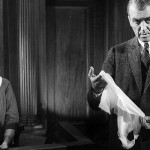Summer Hours Review
It’s with bated breath that I wait to see director Olivier Assayas’ “Carlos†this fall. I might end up hating it, but long (this one’s over 5 hours), epic movies like this always intrigue me. That anticipation came to a head with some glowing reviews out of Cannes, so I decided to sit down and check out the director’s previous film, “Summer Hours.†I knew very little about it going in, but it turned out to be a thoughtful film, albeit emotionally muted.
The death of a loved one is an incredibly difficult, often traumatic time, but “Summer Hours†deals with some of the practical matters of a loved one’s death. Helene (Edith Scob) is turning 75, and she invites her three children, Frederic (Charles Berling), Jeremie (Jeremie Renier), and Adrienne (Juliette Binoche) to their summer home in the French countryside. Instead of celebrating, however, Helene spends most of the time discussing with her children what they ought to do with her expansive art collection when she passes. An unknown number of months later, Helene dies, and her children gather to divvy up the mementos her mother loved so dearly. Frederic wants to keep everything as it is—the house, the paintings, all of it. The other two children prefer to sell it all. They don’t live in France, so the house won’t serve any practical use for them, and the cash could help them better their lives at home.
There’s not a lot of plot to the film, but that’s not a major problem. Instead of unraveling a complex story, Assayas raises questions. Is it dishonorable to rid yourself of a loved one’s possessions right after he or she passes? Do the possessions fill the void of the left by the loved one? Assayas doesn’t provide clear cut answers, but he does give the film a nice bit of closure, when we get to see the house in use by a new generation of the family (albeit for much different reasons than Helene likely intended).
The acting is solid, but I had an overall problem with the lack of emotionality present here. Berling, Renier, and Binoche don’t do a bad job by any means. The screenplay asks them to be a certain way, and they are. But in only two brief scenes do we see these people actually mourning. Perhaps it’s the way of the French, but I would’ve liked to have been a little more invested in this story on an emotional level. Of all the actors, Berling does this the best. His character is closest to Helene, and he really struggles with the decision they make to essentially rid themselves of their childhood.
I now know Assayas is a capable director. This isn’t the best film I’ve seen in a while by any means, but it’s thought-provoking and beautifully filmed. My high hopes for “Carlos†haven’t been diminished. I just hope he can deliver the knockout punch I hoped this one would have.
















